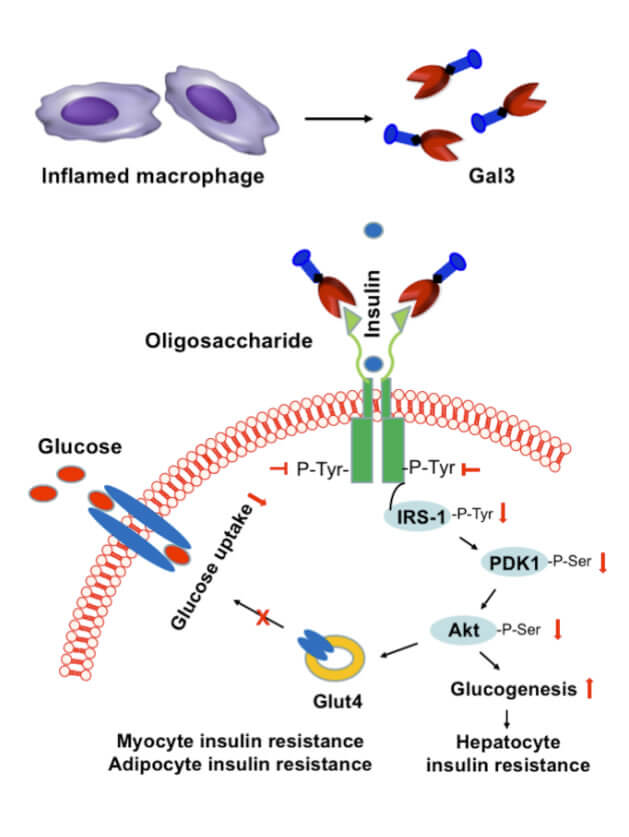In the United States, diabetes is now the third leading cause of death (0.33 million) after heart disease and cancer. Type 2 diabetes (T2D), which accounts for about 90% of all diabetes, is often associated with obesity. It happens when the pancreas doesn’t release enough of the hormone, insulin, or the body’s cells don’t react to insulin. Obesity-associated insulin resistance is a hallmark of T2D and plays a central role in metabolic syndrome. Obesity-induced inflammation and insulin resistance mediated by macrophages and other immune cells are well connected.
Despite many drugs available to treat T2D, no FDA-approved drugs directly work on the insulin receptor (IR) to overcome insulin resistance. Recent studies show that macrophage-derived galectin-3 can bind directly to the IR and inhibit downstream IR signaling causing insulin resistance and impaired glucose tolerance in obesity-induced T2D (see Figure 5). Gal3 is also known to amplify beta-cell apoptosis and islet inflammation in T2D. Administration of galectin-3 to mice causes insulin resistance and glucose intolerance, whereas inhibition of galectin-3, through either genetic or pharmacologic loss of function, improved insulin sensitivity in obese mice. These fundamental observations elucidate a novel role of Gal3 that promotes obesity-mediated inflammation (macrophage-derived galectin-3) and insulin resistance and suggest that specific inhibition of galectin-3 may represent a promising therapeutic strategy to restore insulin sensitivity.
At GlycoMantra, we have shown in relevant animal model that our drug GM101 improves glucose tolerance and insulin sensitivity.

Figure 5. Role of Galectin-3 in the Promotion of Insulin Resistance in Type 2 Diabetes.
Relevant Publications:
- Li P, Liu S et al: Hematopoietic-Derived Galectin-3 Causes Cellular and Systemic Insulin Resistance. Cell 2016, 167:973-984. [PubMed]
https://www.ncbi.nlm.nih.gov/pmc/articles/PMC5179329/
- Petrovic I, Pejnovic N et al: Overexpression of galectin 3 in pancreatic cells amplifies b-cell apoptosis and islet inflammation in type-2 diabetes in mice. Front. Endocrinol. 2020, 11:30 [PubMed]
https://www.ncbi.nlm.nih.gov/pmc/articles/PMC7018709/
